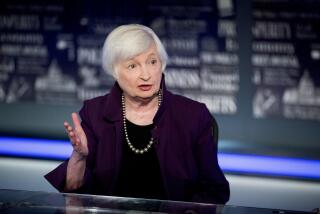Credit-rating firms’ shortcomings are pointed out by SEC
- Share via
Credit-rating companies in the United States are beset by shortcomings, failing to act quickly enough to issue downgrades and not properly documenting ratings decisions, the Securities and Exchange Commission said in a report.
The SEC said Thursday that the country’s largest credit-rating firms — Standard & Poor’s Corp., Moody’s Investors Service and Fitch Ratings — did not follow their own policies in issuing ratings and failed to accurately document their decisions.
This was the second report the SEC has issued about ratings firms, a responsibility the agency inherited under the Dodd-Frank financial reform act. The report evaluated the performance of rating companies from August 2010 through September 2011.
Eight of nine firms made changes that the SEC had recommended in a 2011 report, the agency said in its latest report. One of the “smaller” firms “failed to appropriately address the vast majority of recommendations from the 2011 examination,” the SEC said in the report. The report did not name any firm, instead identifying them as the “three largest” or “smaller” ratings companies.
“The SEC’s enhanced oversight … is having a positive effect,” said Thomas J. Butler, director of the SEC’s credit ratings office, which was created under Dodd-Frank. “The firms have been generally responsive to the staff’s recommendations, which are intended to strengthen … policies, procedures and operations and to make their internal governance and controls more robust.”
The three large credit-rating firms said they were satisfied with the SEC’s report and were working to make improvements that the agency suggested.
S&P; spokesman Edward Sweeney said in a statement that the firm “has continually enhanced its ratings process, governance and compliance function, including proactively making a number of the changes that are now being recommended by the SEC.”
S&P; is the largest credit-rating firm in the world, with more than 1,400 analysts and managers.
Credit-rating firms evaluate companies and government agencies seeking to issue debt through bonds or other securities. The ratings they receive affect the interest rate on the debt.
Joshua Rosner, managing director of research firm Graham Fisher & Co., said he believes the ratings companies have “poor internal controls, a lack of strong oversight and no reduction in the conflicts of interest that exacerbated the [2008 economic] crisis.”
“We’ve all gotten a few years older, but very, very little has changed since 2008,” Rosner said.
Rosner and others criticized the ratings firms for failing to reduce the credit ratings of mortgage-backed securities largely blamed for the 2008 economic crisis.
“We’ve done some wonderfully impressive rain dances in hopes things would change but have taken very little meaningful action to make sure they have,” Rosner said.
More to Read
Inside the business of entertainment
The Wide Shot brings you news, analysis and insights on everything from streaming wars to production — and what it all means for the future.
You may occasionally receive promotional content from the Los Angeles Times.











